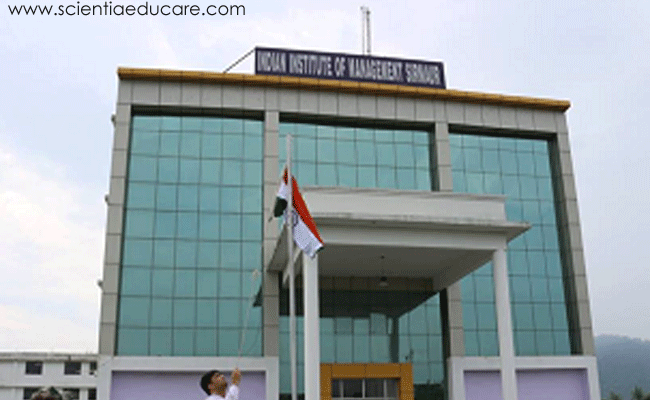Global Career and Job Opportunities
All
- All
- Abnormal Psychology
- Advanced Grammar Concepts
- Advanced Grammar Topics
- Age of Exploration European History
- Agricultural Universities in India
- AI and Career Opportunities
- AI and Ethics
- AI in Business and Economy
- AI in Competitive Exams
- AI in Daily Life
- AI in Defense and Security
- AI in Education
- AI in Entertainment and Media
- AI in Healthcare and Medicine
- AI in Law and Governance
- AI in Science and Technology
- Ancient Europe
- Ancient History
- Animal Physiology
- Applied Economics
- Applied Life Sciences
- Art, Culture and Philosophy European History
- Basic Economics Concepts
- Basics of English Grammar
- Beauty
- Behavioral Psychology
- Biochemistry
- Biological Psychology
- Biology Basics and Fundamentals
- Biology Topics with MCQs
- Biophysics and Structural Biology
- Biotechnology
- Botany
- Career Article
- CBSE Schools in Assam
- CBSE Schools in India
- CBSE Syllabus
- Cell Biology
- Central Universities in India
- Clinical Psychology
- Cognitive Psychology
- Colonialism and Its Impact European History
- Creative Grammar Topics
- Cultural History
- Cultural Psychology
- Culture
- Culture and Society
- Development Economics
- Developmental Biology
- Developmental Biology and Embryology
- Developmental Psychology
- Dining
- Ecology
- Ecology and Environmental Biology
- Economic History
- Economic Systems
- Economics and Finance
- Economics Topics Exams oriented
- Economics Topics with MCQs
- Education
- Educational Blogs
- Educational Institutions in Assam
- Educational Institutions in India
- Educational Institutions Worldwide
- Educational Psychology
- Endocrinology
- English Grammar
- English Language and Literature
- Environment and Ecology
- Environmental Biology
- Error Identification and Correction
- Essay Writing
- European Economy
- European History
- European History Key Personalities
- European Political History
- European Social Movements
- Evolutionary Biology
- Exam-Focused Practice Topics
- Examinations in India
- Experimental Psychology
- Fashion
- Featured
- Fitness
- Forensic Psychology
- Future Prospects of AI
- Gadgets
- General European History
- General Overview of AI
- Genetics
- Genetics and Evolution
- Global Career and Job Opportunities
- Grammar for Academic Excellence
- Grammar for Competitive Exams
- Grammar for Spoken English
- Health
- Health and Fitness
- Health Psychology
- Historical and Contemporary Economics
- History and Civics
Top 10 Civil Engineering Jobs in Demand Worldwide
Top 10 Civil Engineering Jobs in Demand Worldwide
Civil engineering is a cornerstone of modern infrastructure, playing a pivotal role in the design, construction, and...
Tourism Worldwide
All
- All
- Abnormal Psychology
- Advanced Grammar Concepts
- Advanced Grammar Topics
- Age of Exploration European History
- Agricultural Universities in India
- AI and Career Opportunities
- AI and Ethics
- AI in Business and Economy
- AI in Competitive Exams
- AI in Daily Life
- AI in Defense and Security
- AI in Education
- AI in Entertainment and Media
- AI in Healthcare and Medicine
- AI in Law and Governance
- AI in Science and Technology
- Ancient Europe
- Ancient History
- Animal Physiology
- Applied Economics
- Applied Life Sciences
- Art, Culture and Philosophy European History
- Basic Economics Concepts
- Basics of English Grammar
- Beauty
- Behavioral Psychology
- Biochemistry
- Biological Psychology
- Biology Basics and Fundamentals
- Biology Topics with MCQs
- Biophysics and Structural Biology
- Biotechnology
- Botany
- Career Article
- CBSE Schools in Assam
- CBSE Schools in India
- CBSE Syllabus
- Cell Biology
- Central Universities in India
- Clinical Psychology
- Cognitive Psychology
- Colonialism and Its Impact European History
- Creative Grammar Topics
- Cultural History
- Cultural Psychology
- Culture
- Culture and Society
- Development Economics
- Developmental Biology
- Developmental Biology and Embryology
- Developmental Psychology
- Dining
- Ecology
- Ecology and Environmental Biology
- Economic History
- Economic Systems
- Economics and Finance
- Economics Topics Exams oriented
- Economics Topics with MCQs
- Education
- Educational Blogs
- Educational Institutions in Assam
- Educational Institutions in India
- Educational Institutions Worldwide
- Educational Psychology
- Endocrinology
- English Grammar
- English Language and Literature
- Environment and Ecology
- Environmental Biology
- Error Identification and Correction
- Essay Writing
- European Economy
- European History
- European History Key Personalities
- European Political History
- European Social Movements
- Evolutionary Biology
- Exam-Focused Practice Topics
- Examinations in India
- Experimental Psychology
- Fashion
- Featured
- Fitness
- Forensic Psychology
- Future Prospects of AI
- Gadgets
- General European History
- General Overview of AI
- Genetics
- Genetics and Evolution
- Global Career and Job Opportunities
- Grammar for Academic Excellence
- Grammar for Competitive Exams
- Grammar for Spoken English
- Health
- Health and Fitness
- Health Psychology
- Historical and Contemporary Economics
- History and Civics
Tourism in India
All
- All
- Abnormal Psychology
- Advanced Grammar Concepts
- Advanced Grammar Topics
- Age of Exploration European History
- Agricultural Universities in India
- AI and Career Opportunities
- AI and Ethics
- AI in Business and Economy
- AI in Competitive Exams
- AI in Daily Life
- AI in Defense and Security
- AI in Education
- AI in Entertainment and Media
- AI in Healthcare and Medicine
- AI in Law and Governance
- AI in Science and Technology
- Ancient Europe
- Ancient History
- Animal Physiology
- Applied Economics
- Applied Life Sciences
- Art, Culture and Philosophy European History
- Basic Economics Concepts
- Basics of English Grammar
- Beauty
- Behavioral Psychology
- Biochemistry
- Biological Psychology
- Biology Basics and Fundamentals
- Biology Topics with MCQs
- Biophysics and Structural Biology
- Biotechnology
- Botany
- Career Article
- CBSE Schools in Assam
- CBSE Schools in India
- CBSE Syllabus
- Cell Biology
- Central Universities in India
- Clinical Psychology
- Cognitive Psychology
- Colonialism and Its Impact European History
- Creative Grammar Topics
- Cultural History
- Cultural Psychology
- Culture
- Culture and Society
- Development Economics
- Developmental Biology
- Developmental Biology and Embryology
- Developmental Psychology
- Dining
- Ecology
- Ecology and Environmental Biology
- Economic History
- Economic Systems
- Economics and Finance
- Economics Topics Exams oriented
- Economics Topics with MCQs
- Education
- Educational Blogs
- Educational Institutions in Assam
- Educational Institutions in India
- Educational Institutions Worldwide
- Educational Psychology
- Endocrinology
- English Grammar
- English Language and Literature
- Environment and Ecology
- Environmental Biology
- Error Identification and Correction
- Essay Writing
- European Economy
- European History
- European History Key Personalities
- European Political History
- European Social Movements
- Evolutionary Biology
- Exam-Focused Practice Topics
- Examinations in India
- Experimental Psychology
- Fashion
- Featured
- Fitness
- Forensic Psychology
- Future Prospects of AI
- Gadgets
- General European History
- General Overview of AI
- Genetics
- Genetics and Evolution
- Global Career and Job Opportunities
- Grammar for Academic Excellence
- Grammar for Competitive Exams
- Grammar for Spoken English
- Health
- Health and Fitness
- Health Psychology
- Historical and Contemporary Economics
- History and Civics
Bhimbetka Rock Shelters: A Timeless Window into Prehistoric India
Bhimbetka Rock Shelters: A Timeless Window into Prehistoric India
Introduction
Bhimbetka Rock Shelters, located in the Raisen district of Madhya Pradesh, India, are a UNESCO World...
Kumbhalgarh Fort: The Majestic Sentinel of Mewar
Kumbhalgarh Fort: The Majestic Sentinel of Mewar
Kumbhalgarh Fort, located in the Rajsamand district of Rajasthan, is a UNESCO World Heritage Site and an architectural...
Agricultural Universities in India
All
- All
- Abnormal Psychology
- Advanced Grammar Concepts
- Advanced Grammar Topics
- Age of Exploration European History
- Agricultural Universities in India
- AI and Career Opportunities
- AI and Ethics
- AI in Business and Economy
- AI in Competitive Exams
- AI in Daily Life
- AI in Defense and Security
- AI in Education
- AI in Entertainment and Media
- AI in Healthcare and Medicine
- AI in Law and Governance
- AI in Science and Technology
- Ancient Europe
- Ancient History
- Animal Physiology
- Applied Economics
- Applied Life Sciences
- Art, Culture and Philosophy European History
- Basic Economics Concepts
- Basics of English Grammar
- Beauty
- Behavioral Psychology
- Biochemistry
- Biological Psychology
- Biology Basics and Fundamentals
- Biology Topics with MCQs
- Biophysics and Structural Biology
- Biotechnology
- Botany
- Career Article
- CBSE Schools in Assam
- CBSE Schools in India
- CBSE Syllabus
- Cell Biology
- Central Universities in India
- Clinical Psychology
- Cognitive Psychology
- Colonialism and Its Impact European History
- Creative Grammar Topics
- Cultural History
- Cultural Psychology
- Culture
- Culture and Society
- Development Economics
- Developmental Biology
- Developmental Biology and Embryology
- Developmental Psychology
- Dining
- Ecology
- Ecology and Environmental Biology
- Economic History
- Economic Systems
- Economics and Finance
- Economics Topics Exams oriented
- Economics Topics with MCQs
- Education
- Educational Blogs
- Educational Institutions in Assam
- Educational Institutions in India
- Educational Institutions Worldwide
- Educational Psychology
- Endocrinology
- English Grammar
- English Language and Literature
- Environment and Ecology
- Environmental Biology
- Error Identification and Correction
- Essay Writing
- European Economy
- European History
- European History Key Personalities
- European Political History
- European Social Movements
- Evolutionary Biology
- Exam-Focused Practice Topics
- Examinations in India
- Experimental Psychology
- Fashion
- Featured
- Fitness
- Forensic Psychology
- Future Prospects of AI
- Gadgets
- General European History
- General Overview of AI
- Genetics
- Genetics and Evolution
- Global Career and Job Opportunities
- Grammar for Academic Excellence
- Grammar for Competitive Exams
- Grammar for Spoken English
- Health
- Health and Fitness
- Health Psychology
- Historical and Contemporary Economics
- History and Civics
Govind Ballabh Pant University of Agriculture & Technology, Uttaranchal – A Pioneer in Agricultural...
Govind Ballabh Pant University of Agriculture & Technology, Uttaranchal – A Pioneer in Agricultural Education
Introduction
Govind Ballabh Pant University of Agriculture & Technology (GBPUAT), located...
Dr. YSR Horticultural University, Andhra Pradesh: A Hub for Horticultural Excellence
Dr. YSR Horticultural University, Andhra Pradesh: A Hub for Horticultural Excellence
Introduction
Dr. YSR Horticultural University (Dr. YSRHU) is a premier institution dedicated to horticultural education,...
CSK Himachal Pradesh Krishi Vishvavidyalaya: A Pioneer in Agricultural Education and Research
CSK Himachal Pradesh Krishi Vishvavidyalaya: A Pioneer in Agricultural Education and Research
Introduction
CSK Himachal Pradesh Krishi Vishvavidyalaya (CSK HPKV), formerly known as Himachal Pradesh Krishi...
University of Agricultural Sciences, Dharwad, Karnataka: A Comprehensive Guide
University of Agricultural Sciences, Dharwad, Karnataka: A Comprehensive Guide
Introduction
The University of Agricultural Sciences, Dharwad (UAS Dharwad) is a premier institution dedicated to agricultural education,...
Dr. Yashwant Singh Parmar University of Horticulture & Forestry, Himachal Pradesh: A Comprehensive Guide
Dr. Yashwant Singh Parmar University of Horticulture & Forestry, Himachal Pradesh: A Comprehensive Guide
Introduction
Dr. Yashwant Singh Parmar University of Horticulture & Forestry (YSPUHF) is...
Ecology and Environmental Biology
All
- All
- Abnormal Psychology
- Advanced Grammar Concepts
- Advanced Grammar Topics
- Age of Exploration European History
- Agricultural Universities in India
- AI and Career Opportunities
- AI and Ethics
- AI in Business and Economy
- AI in Competitive Exams
- AI in Daily Life
- AI in Defense and Security
- AI in Education
- AI in Entertainment and Media
- AI in Healthcare and Medicine
- AI in Law and Governance
- AI in Science and Technology
- Ancient Europe
- Ancient History
- Animal Physiology
- Applied Economics
- Applied Life Sciences
- Art, Culture and Philosophy European History
- Basic Economics Concepts
- Basics of English Grammar
- Beauty
- Behavioral Psychology
- Biochemistry
- Biological Psychology
- Biology Basics and Fundamentals
- Biology Topics with MCQs
- Biophysics and Structural Biology
- Biotechnology
- Botany
- Career Article
- CBSE Schools in Assam
- CBSE Schools in India
- CBSE Syllabus
- Cell Biology
- Central Universities in India
- Clinical Psychology
- Cognitive Psychology
- Colonialism and Its Impact European History
- Creative Grammar Topics
- Cultural History
- Cultural Psychology
- Culture
- Culture and Society
- Development Economics
- Developmental Biology
- Developmental Biology and Embryology
- Developmental Psychology
- Dining
- Ecology
- Ecology and Environmental Biology
- Economic History
- Economic Systems
- Economics and Finance
- Economics Topics Exams oriented
- Economics Topics with MCQs
- Education
- Educational Blogs
- Educational Institutions in Assam
- Educational Institutions in India
- Educational Institutions Worldwide
- Educational Psychology
- Endocrinology
- English Grammar
- English Language and Literature
- Environment and Ecology
- Environmental Biology
- Error Identification and Correction
- Essay Writing
- European Economy
- European History
- European History Key Personalities
- European Political History
- European Social Movements
- Evolutionary Biology
- Exam-Focused Practice Topics
- Examinations in India
- Experimental Psychology
- Fashion
- Featured
- Fitness
- Forensic Psychology
- Future Prospects of AI
- Gadgets
- General European History
- General Overview of AI
- Genetics
- Genetics and Evolution
- Global Career and Job Opportunities
- Grammar for Academic Excellence
- Grammar for Competitive Exams
- Grammar for Spoken English
- Health
- Health and Fitness
- Health Psychology
- Historical and Contemporary Economics
- History and Civics
Endangered Species: Extinction and Protection Strategies
Understanding the Causes of Extinction and Protection Strategies for Endangered Species
The rapid decline in global biodiversity has become a pressing concern, with numerous species...
Environmental Pollution: Types, Sources and Effects
Environmental Pollution: Types, Sources and Effects
Introduction:
Environmental pollution is one of the most pressing global challenges today. It encompasses various forms of contamination that degrade...
Ecosystems: Structure, Function and Types
Ecosystems: Structure, Function and Types – Understanding the Core of Ecological Balance
Introduction
An ecosystem refers to a biological community of interacting organisms and their physical...
Food Chains and Food Webs: Energy Flow in Ecosystems
Understanding Energy Flow in Ecosystems Through Food Chains and Food Webs
Introduction: The Role of Food Chains and Food Webs in Ecosystems
In every ecosystem, energy...
Climate Change: Impact on Ecosystems and Biodiversity
Climate Change and Its Profound Impact on Ecosystems and Biodiversity
Climate change, driven by human activities such as the burning of fossil fuels and deforestation,...
Research laboratories in India
All
- All
- Abnormal Psychology
- Advanced Grammar Concepts
- Advanced Grammar Topics
- Age of Exploration European History
- Agricultural Universities in India
- AI and Career Opportunities
- AI and Ethics
- AI in Business and Economy
- AI in Competitive Exams
- AI in Daily Life
- AI in Defense and Security
- AI in Education
- AI in Entertainment and Media
- AI in Healthcare and Medicine
- AI in Law and Governance
- AI in Science and Technology
- Ancient Europe
- Ancient History
- Animal Physiology
- Applied Economics
- Applied Life Sciences
- Art, Culture and Philosophy European History
- Basic Economics Concepts
- Basics of English Grammar
- Beauty
- Behavioral Psychology
- Biochemistry
- Biological Psychology
- Biology Basics and Fundamentals
- Biology Topics with MCQs
- Biophysics and Structural Biology
- Biotechnology
- Botany
- Career Article
- CBSE Schools in Assam
- CBSE Schools in India
- CBSE Syllabus
- Cell Biology
- Central Universities in India
- Clinical Psychology
- Cognitive Psychology
- Colonialism and Its Impact European History
- Creative Grammar Topics
- Cultural History
- Cultural Psychology
- Culture
- Culture and Society
- Development Economics
- Developmental Biology
- Developmental Biology and Embryology
- Developmental Psychology
- Dining
- Ecology
- Ecology and Environmental Biology
- Economic History
- Economic Systems
- Economics and Finance
- Economics Topics Exams oriented
- Economics Topics with MCQs
- Education
- Educational Blogs
- Educational Institutions in Assam
- Educational Institutions in India
- Educational Institutions Worldwide
- Educational Psychology
- Endocrinology
- English Grammar
- English Language and Literature
- Environment and Ecology
- Environmental Biology
- Error Identification and Correction
- Essay Writing
- European Economy
- European History
- European History Key Personalities
- European Political History
- European Social Movements
- Evolutionary Biology
- Exam-Focused Practice Topics
- Examinations in India
- Experimental Psychology
- Fashion
- Featured
- Fitness
- Forensic Psychology
- Future Prospects of AI
- Gadgets
- General European History
- General Overview of AI
- Genetics
- Genetics and Evolution
- Global Career and Job Opportunities
- Grammar for Academic Excellence
- Grammar for Competitive Exams
- Grammar for Spoken English
- Health
- Health and Fitness
- Health Psychology
- Historical and Contemporary Economics
- History and Civics
CEERI – Central Electronics Engineering Research Institute Pilani
CEERI - Central Electronics Engineering Research Institute Pilani
Central Electronics Engineering Research Institute, located at Pilani, Distt.Jhunjhunu, Rajasthan and Chennai, Tamil Nadu is a pioneer...
Central Road Research Institute New Delhi
CRRI - Central Road Research Institute New Delhi
Road and road transport infrastructure is essential for socio-economic and technological progress of a nation. R&D efforts...
Central Food Technological Research Institute Mysore
CFTRI - Central Food Technological Research Institute Mysore
CSIR-Central Food Technological Research Institute, abbreviated to CSIR-CFTRI, is one of the 40 national research laboratories in...
NML – National Metallurgical Laboratory Jamshedpur
NML - National Metallurgical Laboratory Jamshedpur
The National Metallurgical Laboratory, the third in the Council of Scientific & Industrial Research (CSIR) family of 38 laboratories....
NEERI – National Environmental Engineering Research Institute, Nagpur
NEERI - National Environmental Engineering Research Institute Nagpur
The National Environmental Engineering Research Institute (NEERI) is a research institute created and funded by Government of...



















































